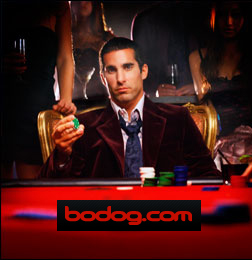 In 1994, the well-known entrepreneur and online gambling expert Calvin Ayre sold everything he owned and gathered $10,000, which he used to assemble a team of professionals and managed to launch the first company under the Bodog brand name.
In 1994, the well-known entrepreneur and online gambling expert Calvin Ayre sold everything he owned and gathered $10,000, which he used to assemble a team of professionals and managed to launch the first company under the Bodog brand name.
Little did he know back then that someday Bodog would be one of the leading online entertainment brands in the world. Initially, Bodog was envisioned to be a software developer for online entertainment, but Ayre is a visionary and Bodog quickly turned into an online entertainment giant with global appeal and recognition.
In its beginnings, Bodog focused on the US market and the company established itself as a solid and reputable online gambling entity. Bodog evolved into a multifaceted company, catering to different areas of the online entertainment business, offering diverse services like online sports betting, poker, casinos, magazines, mixed-martial arts production, reality TV and a record label. However, all of this success did not come easy for Bodog, the company encountered plenty of bumps in the road that they have managed to overcome thanks to great leadership and a solid team of professionals that have looked after the company in all aspects.
To learn more about the Bodog affiliate program, check out Bodog’s program details.
 The 2000s: From Riches to Rags…
The 2000s: From Riches to Rags…
The expansion of the Bodog brand took off in the mid 2000s, in 2004 Bodog Poker was born as well as Bodog Nation, their online magazine, and Bodog Beat, a blog. In 2005, the Bodog brand launched Bodog Music, a music label company, Bodog Fight, a mixed martial arts production, and Bodog TV, a reality TV network.
Throughout the early 2000s Bodog presented solid growth and its popularity kept rising in the United States. Everyone remembers the times when Ayre was behind the Bodog brand (bodog.net), mainly due to the strong and creative advertising campaigns they designed for TV and for various locations like bathrooms, billboards, magazines, sports events, and pretty much everywhere you can put ads on
Nonetheless, the 2000s were rough years for Bodog as the company had legal issues with their domain name and branding — which is why online gamblers have come to know the brand through different domain names throughout the years (Bodog.com, BodogPoker.com, BodogLife.com, newBodog.com, Bodog.eu, Bovada.lv).
In 2007, a legal battle with 1st Technology, a software company, which accused Bodog of illegal use of their trademarked system cost Bodog $49 million dollars and their domain name. Bodog ran under newbodog.com and bodoglife.com but a few years after the lawsuit was settled, the company managed to reach an agreement with the 1st Technology and Bodog.com came back to life in 2009. This was a time of great loss and re-shaping for Bodog, considering that besides the $49 million dollars Bodog paid to 1st Technology, they also had to pay big amounts of money to affiliates for the loss of Google rankings and many other issues that came along.
The rough times were nothing but a drive and an inspiration to the Bodog team, still led by Calvin Ayre at the time. Calvin Ayre has been a key element for the creation and development of the effective strategic business model behind the Bodog brand. While most people involved with Bodog were panicking over the 1st Technology case, Calvin Ayre and his team had been planning and designing what would be the business strategy that would put the company back on its feet.
 In late 2007 and early 2008 Bodog took a new approach to business by enabling a model that would stop them from operating the websites directly, so the company started granting licenses to third parties to run those websites under the Bodog brand name instead. This new model led to the acquisition of BodogBrand.com by the Canadian Morris Mohawk Gaming Group. This group was in charge of offering gambling services in the United States and Canada under the Bodog brand at the time, but Bodog was ready to embark on a journey for global expansion.
In late 2007 and early 2008 Bodog took a new approach to business by enabling a model that would stop them from operating the websites directly, so the company started granting licenses to third parties to run those websites under the Bodog brand name instead. This new model led to the acquisition of BodogBrand.com by the Canadian Morris Mohawk Gaming Group. This group was in charge of offering gambling services in the United States and Canada under the Bodog brand at the time, but Bodog was ready to embark on a journey for global expansion.Calvin Ayre did a great job paving the way for the company to go global since its beginnings in the US market, so the next step for the company came fairly easy due to Bodog’s solid reputation and the trust players put on the brand. There was also the fact that Ayre already had celebrity-qualities and made appearances Around this time Bodog granted licenses to European third parties and also licensed the brand to Haydock Entertainment to enter the Asian markets. This strategy was extremely effective and Bodog soon became a world-wide gambling industry leaders and the name was renowned in all corners of the globe.
Bodog’s Post-Calvin Ayre Era
In 2008 Calvin Ayre announced his retirement from the company as he expressed he had a personal interest in dedicating himself fully to the Calvin Ayre Foundation. The Calvin Ayre Foundation is another one of Ayre’s dreams and it does charity work for education, the environment, animal welfare, child welfare and social development from its base in London. This was sad news for the company, but today many people say that Ayre’s retirement from Bodog was never real as he continues to be an ambassador for the site on a regular basis and enjoys being involved.
Bodog’s post-Calvin Ayre era began in 2008 and the upcoming years ran smoothly for the company. In 2009 Bodog created its own poker network (The Bodog Network) through a license agreement with BodogBrand.com. Bodog has been growing and expanding as a company for the last 17 years and so in December of 2011 the company decided that it was no longer worth it to deal with all the issues that come with the US online gambling market and withdrew from it. This action meant the termination of Bodog’s license agreement with the Morris Mohawk Gaming Group, which in response launched Bovada as their new online gambling services provider for US customers.
Today, Bodog continues to be a leading online gambling company outside of the United States and it continues to offer services in many other areas. Bodog is one of the oldest and most reputable companies in the online gambling industry and it is currently focusing in the Asian market and the United Kingdom.
